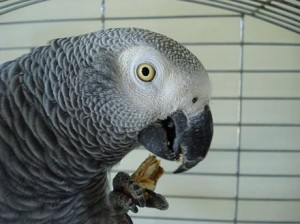2 Answers 2 Sorted by:
Generally speaking, foods that are extremely high in sugar, fat, or sodium shouldn’t be fed to many animals, including parrots. Although in theory harmless, consuming too much of these substances can result in a number of health problems. Additionally, a number of foods that are poisonous or potentially poisonous to parrots can be found in sweets:
- chocolate
- licorice
- Sugar substitute xylitol is present in sugar-free candies.
- peanuts
- dairy (not toxic, but parrots are definitely lactose intolerant)
Other poisonous foods exist as well, though they are less common in sweets. The list of items below may not be all-inclusive of all those harmful to parrots.
- Avocado
- Mushrooms (usually the kinds that are unsafe to eat by humans)
- Fruit seeds and pits such as apple seeds
- Plants from the allium family (garlic, onions, and so forth)
- Plants in the nightshade family (fruit-bearing varieties such as tomatoes are acceptable)
- Comfrey, the herb
- Leaves from the rhubarb plant
“Safe” is an illusion. The “safest” thing to do is to not being born.
There are parrots that I know occasionally nibble on chocolate. They are still alive.
Xylitol is not “artificial”, it is birch sugar. It appears that some people are drawing comparisons between it and aspartame, which is absurd.
Additionally, it appears that some people believe parrots are poisoned by the bacteria in our saliva. My own experience proves that this is NOT the case.
Then there is this narrative about parrots being lactose intolerant. That too, according to my own experience, is nonsense. Our parrots have never experienced diarrheal illness despite eating yogurt on a daily basis for many years.
Thanks for contributing an answer to Pets Stack Exchange!
- Please be sure to answer the question. Provide details and share your research!.
- Asking for help, clarification, or responding to other answers.
- expressing opinions and supporting them with references or firsthand knowledge
To learn more, see our tips on writing great answers. Draft saved Draft discarded.
Foods Toxic To Pet Birds
By Christal Pollock, DVM, Dipl. ABVP-Avian, Lafeber Company veterinary consultant, & Laura Doering .
 Creating a list of foods considered dangerous or toxic to pet birds can be a challenge for many reasons. Just as people dont have the same reactions to certain foods that another mammal might have, a food that makes one species of bird ill doesnt necessarily cause illness in another species of bird. Birds belong to Class Aves, a large, diverse group in which many differences exist in anatomy and physiology; so different bird species will demonstrate different sensitivities to toxins.
Creating a list of foods considered dangerous or toxic to pet birds can be a challenge for many reasons. Just as people dont have the same reactions to certain foods that another mammal might have, a food that makes one species of bird ill doesnt necessarily cause illness in another species of bird. Birds belong to Class Aves, a large, diverse group in which many differences exist in anatomy and physiology; so different bird species will demonstrate different sensitivities to toxins.
Another thing to keep in mind is that a lot of pet bird adverse food reaction incidents are based on the unverified reports of the bird owners. For instance, if a pet bird dies soon after eating, its owner could assume that the food item caused the pet’s death.
Determining a food’s precise level of toxicity can also be difficult. Certain foods are safe to eat in moderation or in small amounts, but when consumed in excess, they can make birds sick or even kill them. Given that the presumption is that if a food is toxic to people and other pets, it probably is toxic to birds as well, avian veterinarians use a lot of toxicology information that has been directly transferred from dog, cat, and even human pediatric medicine.
But since it’s usually advisable to err on the side of caution, avian veterinarians rely on such a broad range of information. These foods are listed in order of potential toxicity to pet birds along with corresponding levels of caution.
High-Fat, High-Sodium, High-Sugar Foods
Table foods with high levels of fat, salt, and sugar can seriously harm birds’ health even though they are not technically toxic. Allow your bird to nibble on a noodle before adding the sauce, butter, or salt, rather than giving it a small portion of pasta with sauce.
While sugar-free candy may be a healthier option for humans than traditional sweets, it frequently contains xylitol, a sugar substitute that has been linked to severe hypoglycemia and liver damage in dogs.
FAQ
Can birds have candy?
Can birds eat Haribo?
Can birds have fruit snacks?
What foods are harmful to birds?